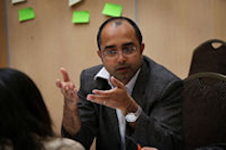Introductory remarks on hope by Dr Indrajit Roy
Dr Indrajit Roy introduces the concept of hope and outlines some of the concepts and questions that motivate this project.

It appears quaint, almost hopelessly naïve, to be inviting reflections on hope in these uncertain times. Climate change endangers the lives and livelihoods of millions of people. Humans and non-humans encounter one another in extraordinary ways. As familiar diseases are fended off, new ones threaten our very existence. Automation disrupts the economies of labour with which we are familiar. Artificial intelligence challenges recognisable forms of human personhood. Unprecedented prosperity coexists with growing inequality. Social polarisation, together with the global rise of right-wing politics, jeopardises the hard-won gains by movements for social justice in recent decades. Just when we thought things couldn’t get any worse, the COVID-19 pandemic struck, changing our world in ways that few other events in recent memory have. Narratives of multiple and overlapping crises abound. As fear, anxiety, hatred and disappointment loom, it is easy to lose sight of the possibilities offered by hope.
However, despite such overwhelming challenges, people live their lives the best they can. They love. They labour. Farmers cope with what they have when faced with rivers inundating their banks, rivers that are swelled by melting glaciers. Workers adapt to new technologies. Nurses and doctors treat patients to the best of their ability, despite not always having the latest medication. Scientists strive to develop vaccines. Businesses invest despite market uncertainties. Poor people claim assistance from the state to help them tide over difficulties. Religious and ethnic minorities organise to demand being recognised as full citizens despite the widespread discrimination to which they are subjected. People send their children to school in the hope that their future generations will live better lives than what they have themselves managed. Animated by the possibility of a better future, people continue to hope, thereby signalling the motivation for ethical activity in moments of crisis and breakdown.
Hope matters.
How do we understand hope?
As the cultural anthropologist Arjun Appadurai clarifies:
Hope in this context is the force that converts the passive condition of ‘waiting for’ to the active condition of ‘waiting to’: waiting to move, waiting to claim full rights, waiting to make the next move in the process that will assure that the queue keeps moving and that the end of the rainbow is not a broken promise.
Hope is rarely defined only in relation to the self. It is not an individual property. When considering possibilities, people may hope for physical security (from one another, from non-humans and the broader environment), higher standards of living, better facilities in education and health, increased respect from others in society, better-paying jobs, durable physical infrastructures, government responsiveness to social problems, and embeddedness in family and community. Such hope-making is enmeshed in broader social, cultural, political and economic processes as an impetus towards a possibility that is felt to be ethical. Thus, the idea of hope goes beyond individual aspirations towards a general improvement of life opportunities. It refers to a collective configuration that relates to the well-being of the entire society.
The temporal orientation of hope may be considered in several ways. Hope may be understood as about looking forward to a better future. It may also involve harking back to a foundational moment that makes it possible to think of a certain kind of life. Finally, hope may well be a way of persevering through the (present) life into which one has been thrown. Hope could involve several, sometimes overlapping processes: coping with growing uncertainties; resilience in the face of loss; investigating new technologies that promise to improve the human condition; calculations about returns to investments; negotiating those in authority; and protesting injustice. Hope is cultivated in the here-and-now with an aim to the future. As the geographer Le Back eloquently puts it, hope “is an attention to the present and the anticipation that something unexpected will happen and emerge from its ruins.”
I have been privileged to hear of such anticipations through the collaborative project "Citizenship futures: The politics of hope" which I convene. The work of my colleagues, who include Professors Simon Parker and Nicole Lindstrom here at York, and social scientists at the French National Centre for Scientific Research, the Indian Institute of Technology and the Brazilian Centre for Analysis and Planning, testifies to such hope. In conversations they and their research assistants have held with people as far apace as London, Paris, Mumbai and Sao Paulo, hope is unmistakable, including- perhaps especially- among the people worst hit by the pandemic. It almost seems like hope nourishes them, keeps them going through the turbulence, not only of the pandemic but also the precariousness that was part of their lives much prior.
Nevertheless, hope is neither wishful thinking nor boundless desire. It is not a utopia. The idea of hope recognises the objective constraints posed by social, economic, geographical and technological structures. It is usually a positively charged emotional investment that conditions and is conditioned by existing practices. While many potential alternatives- rather than a single one- are possible, there remain limits to what might be imagined as potential alternatives. Finally, hope is ‘disappointable’ since it is always possible that what people hoped for does not bear fruition. Uncertainty is integral to understandings of hope just as hope is most potent during times of uncertainty.
